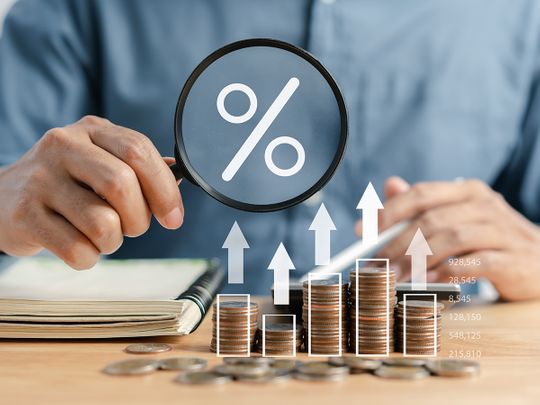
Dubai: If you’re a savvy investor, you would have observed in the recent past that higher interest rates most often tend to negatively affect your investments, particularly the prices of stocks and other market-traded assets.
But does that mean your market investments will rise after the interest rate cut in September? Not all your investments, and veteran investors explain why. Additionally, some investments are expected to move differently than others.
“If interest rates move lower, stock market investors can become more eager to bid up prices because the future profits on such investments will look more attractive than fixed income asset bonds,” explained UAE-based investment advisor Mohammad Shaan.
“Nevertheless, investors will still move their money from investments that are not expected to rise as much, and instead set aside their savings in investments that offer them more reliable means to profits. This is an immediate transition observed in markets whenever interest rates are cut.”
A higher rate meant more expensive borrowing costs, which reduced demand among banks and other financial institutions to lend money. Those who can't or don't want to afford the higher payments postpone projects that involve financing. But that will start to change by year end.
How long will high interest rates keep impacting markets?
So while higher rates have been playing out on stocks, cryptocurrency and commodities such as oil over the last year and more, what can investors expect from here and how long will the rate environment impact markets?
“While the US has already raised rates ten times during this cycle, it’s easy to spot when global markets took notice that the central bank was serious about keeping it going,” said Brody Dunn, an investment manager at a UAE-based asset advisory firm.
“It was November 2021 when many of the riskiest stocks peaked. The stock market will never not worry about future interest rates. The cost of borrowing impacts all areas of investing, purchasing and savings. Just the anticipation of what may happen is enough to cause a stock market reaction.”
In other words, higher interest rates seem to be less frightening for investors these days, as they anticipate the future path of interest rates may be peaking. And this is evident because data indicates that investments have turned increasingly stable since rates hikes slowed.
Investment prices turning less volatile than before
“Markets are far less anxious about interest rate hikes now than in 2023 or 2022,” added Dunn. “With the better-than-expected inflation numbers worldwide, investors may feel like they have some control on inflation. It seems now everyone sees a path to an eventual holding off on rate hikes.”
“When it comes to stock investments, while majority of them worldwide spent most of 2022 and 2023 in decline, they have seem to have found a floor. They’ve fared well since, rising on average more than 15 per cent to a maximum of about 30 per cent.”
Due to compounding effects on money, higher volatility leads to lower average returns, especially lowering the returns of the most volatile stocks. So logically, with lesser volatility, you would be able to get more bang for your buck when investing in markets.
How to invest when interest rates have peaked
As previously flagged, analysts at top investment banks like JP Morgan and Morgan Stanley noted that for investors whose primary objective is income, rising rates mean some fixed-income assets may offer attractive yields. Higher yields also tend to make bonds more attractive relative to riskier assets like stocks.
“When interest rates are high, bond prices fall. For investors looking to sell a bond before it reaches maturity, higher rates meant they need to sell at a discount to face value to compete with newer, higher yielding bonds coming to market,” the research analysts explained recently.
“All else equal, higher rates tend to weigh on stocks, as they can drag on profits and growth potential. This effect often plays out in anticipation of central bank decisions. As it was observed in recent years, stocks continued to turn volatile with interest rates worldwide.”
So for many investors, while fixed income remains an important part of a well-diversified portfolio, Shaan further explained that ‘bond laddering’ is one way to control the amount of exposure investors have to rising rates, while diversifying their investments.
Key takeaways
“Investing in sectors that tend to perform well in a rising interest rate environment can be a smart strategy for maximising returns during periods of increasing rates,” said Shaan. “But if you were wondering how to react when rate cuts affect markets, know this.
“As a general rule of thumb, when interest rates are cut worldwide, it causes stock markets to go up; when interest rates are raised, it causes stock markets to go down. But there is no guarantee as to how the market will react to any given interest rate change.”
But as an investor, if you were not looking to sit around and wait for market volatility to pass, investment advisors also recommend putting some of your savings in safer or less-riskier assets. This includes the above mentioned bonds, or even financial or banking stocks.
“The financial sector has historically been among the most sensitive to changes in interest rates. With profit margins that actually expand as rates climb, entities like banks, insurance companies, brokerage firms, and money managers generally benefit from higher interest rates,” added Dunn.

_resources1_16a4a1613d8_small.jpg)







